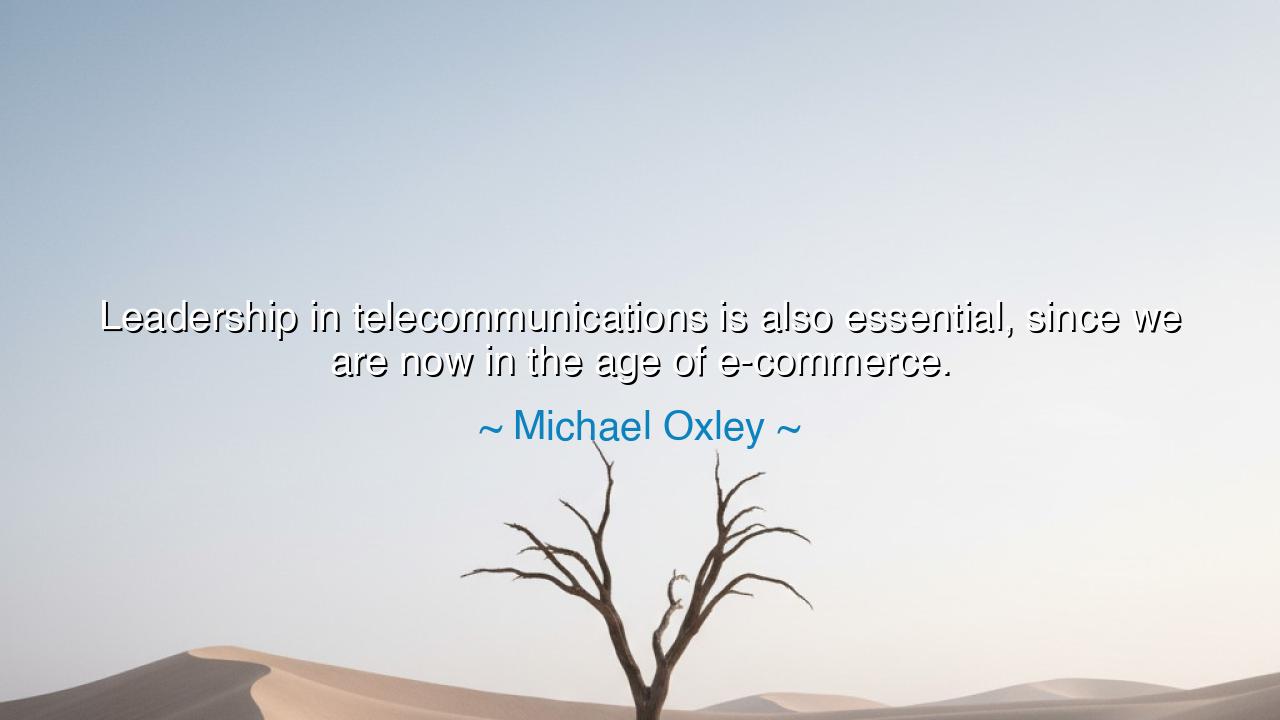
Leadership in telecommunications is also essential, since we are
Leadership in telecommunications is also essential, since we are now in the age of e-commerce.






The words of Michael Oxley—“Leadership in telecommunications is also essential, since we are now in the age of e-commerce.”—resound like a proclamation from one era to the next, a declaration that the world has entered a new frontier where the voice and vision of leadership must evolve with the tools of connection. In these words, there lies not only a statement about technology but a revelation about civilization itself. For every age of mankind has been marked by its networks—first of roads, then of ships, and now of invisible threads of light that carry words, ideas, and commerce across the globe. In this new domain, the masters are not those who build fortresses, but those who build communication.
Oxley’s insight was born in the dawn of the digital revolution, a time when humanity had begun its transformation from the physical marketplace to the boundless realm of e-commerce. To say that leadership in telecommunications is essential is to recognize that the foundation of modern civilization rests not upon stone, but upon signal. It is through the cables beneath the sea, the satellites above the clouds, and the servers humming in quiet rooms that the world now breathes and moves. Commerce, culture, and knowledge have been woven into a single tapestry of connection. Thus, the leader of this new age is not merely a ruler of men, but a shepherd of networks, one who understands that the fate of nations and the prosperity of people depend upon the flow of information.
In ages past, the empires that dominated the world were those who commanded the trade routes. The Phoenicians, by mastering the art of navigation, became the first great merchants of antiquity. The Romans, by building their vast network of roads, bound distant lands into a single body of empire. In the same spirit, those who command telecommunications now command the arteries of the modern world. The wise leader, therefore, is one who recognizes that digital communication is not merely a convenience—it is the lifeblood of the age. Just as the ancient rulers secured the highways for trade, the leaders of our time must secure the networks for trust, innovation, and equity in commerce.
To speak of leadership in this context is to speak not only of technical mastery but of moral stewardship. For with great connectivity comes great responsibility. In the age of e-commerce, where wealth and influence are measured in data rather than gold, the temptation to exploit, manipulate, or divide becomes ever greater. The true leader, therefore, must be both visionary and virtuous, understanding that the purpose of communication is not domination, but cooperation. A leader in telecommunications must ensure that the lines which carry profit also carry truth, that the platforms which unite markets also unite hearts. Leadership, in this sense, is not merely about power—it is about preserving the integrity of connection.
Consider, as a living parable, the story of Tim Berners-Lee, the inventor of the World Wide Web. When he created the web, he could have claimed it as his private empire, charging tolls for access to the highways of information. Yet he chose to make it open to all, a gift to humanity. His leadership was not that of conquest, but of generosity, and it reshaped the world. Because of his decision, ideas and businesses that once would have taken decades to reach the world now do so in seconds. He stands as an emblem of the truth that the greatest leadership is service, and that in the age of telecommunications, to empower others is to strengthen oneself.
Michael Oxley, known for his role in advancing economic legislation, saw early that e-commerce would define the future of trade. His statement was not merely political—it was prophetic. He understood that without wise leadership to guide the growth of digital infrastructure, society could lose its balance. The age of telecommunications is like the discovery of fire: it can bring light to every corner of the earth, or it can consume what is good if left untamed. Thus, his call for leadership is a call for guardianship—to ensure that progress serves the human spirit, not the reverse.
Let this be the lesson for our generation and those to come: in the age of connection, to lead is to listen, to serve is to communicate, and to govern is to unite. Seek not to build walls of isolation, but bridges of understanding. Whether you lead a business, a community, or a nation, recognize that your influence flows through the networks you nurture. Be vigilant with your words, for they travel farther than ever before. Be just with your actions, for they echo across invisible continents. In this world bound by fiber and frequency, the true measure of leadership is not how loudly one speaks, but how clearly one uplifts others through the channels of trust.
So remember, as Oxley reminds us: the age of e-commerce is not merely an age of machines—it is an age of minds and hearts intertwined by technology. The leaders who will thrive in it are those who master not only systems, but human connection itself. They are the new navigators of the digital seas, charting paths not of conquest but of cooperation. And their legacy will be the same as that of all great leaders before them—to leave behind a world more connected, more enlightened, and more human than the one they inherited.






AAdministratorAdministrator
Welcome, honored guests. Please leave a comment, we will respond soon